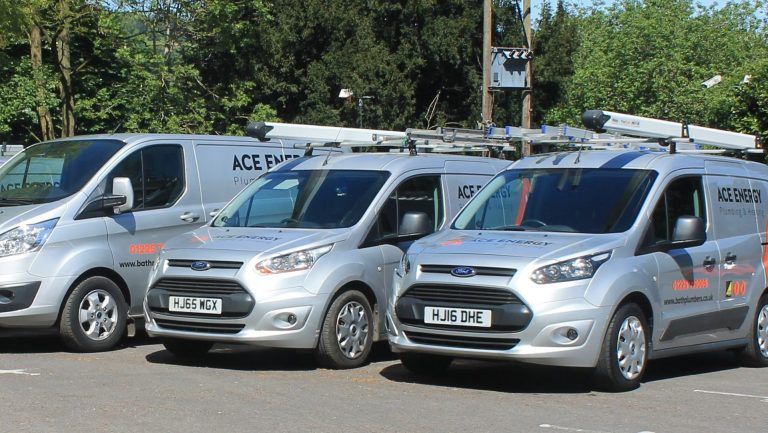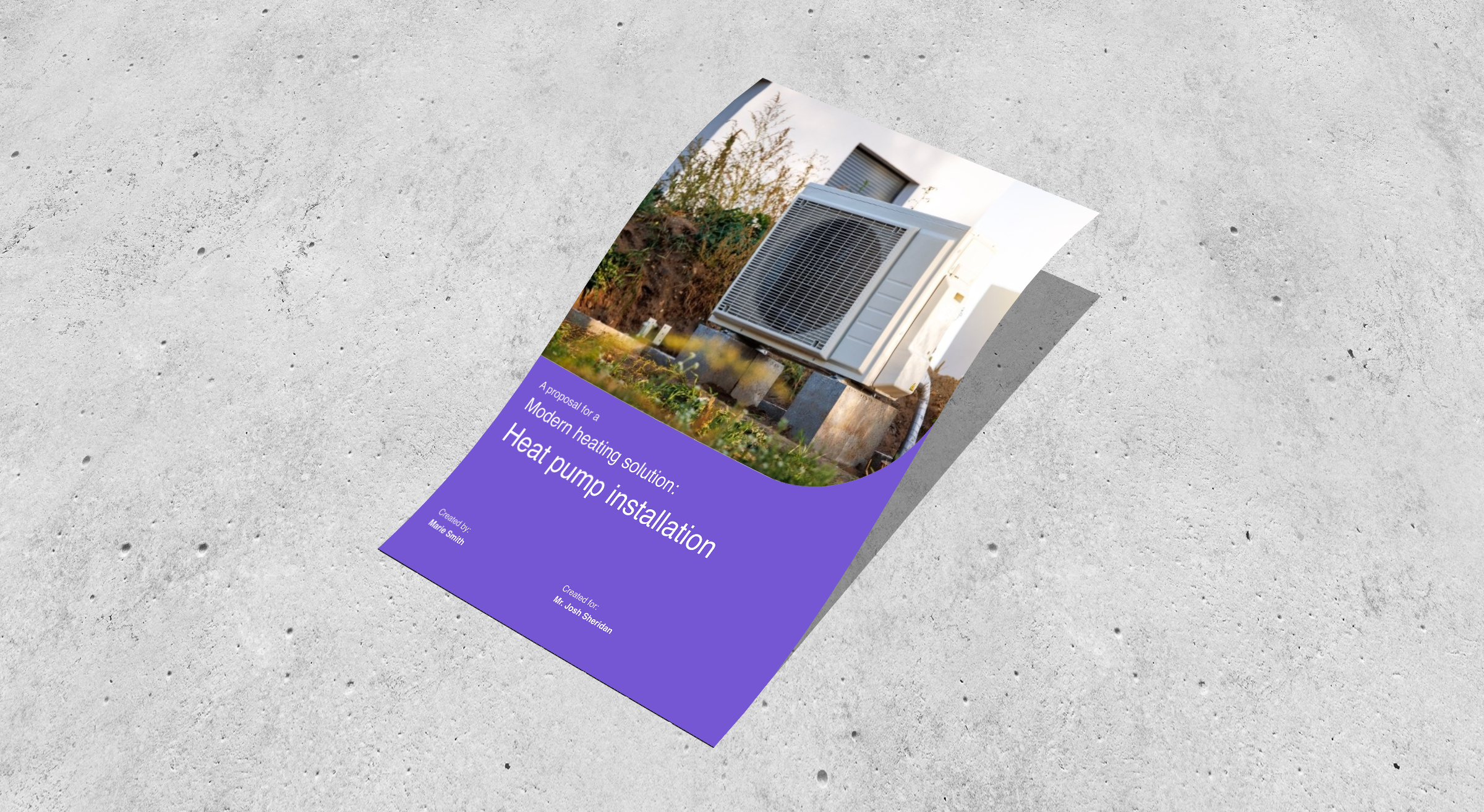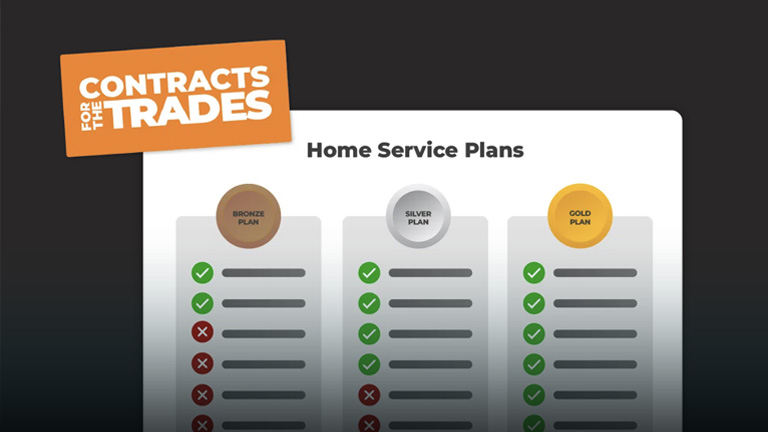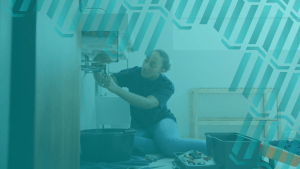3 Women Who Are Changing the Plumbing Industry
March 5, 2019 | Read: 16 minutes
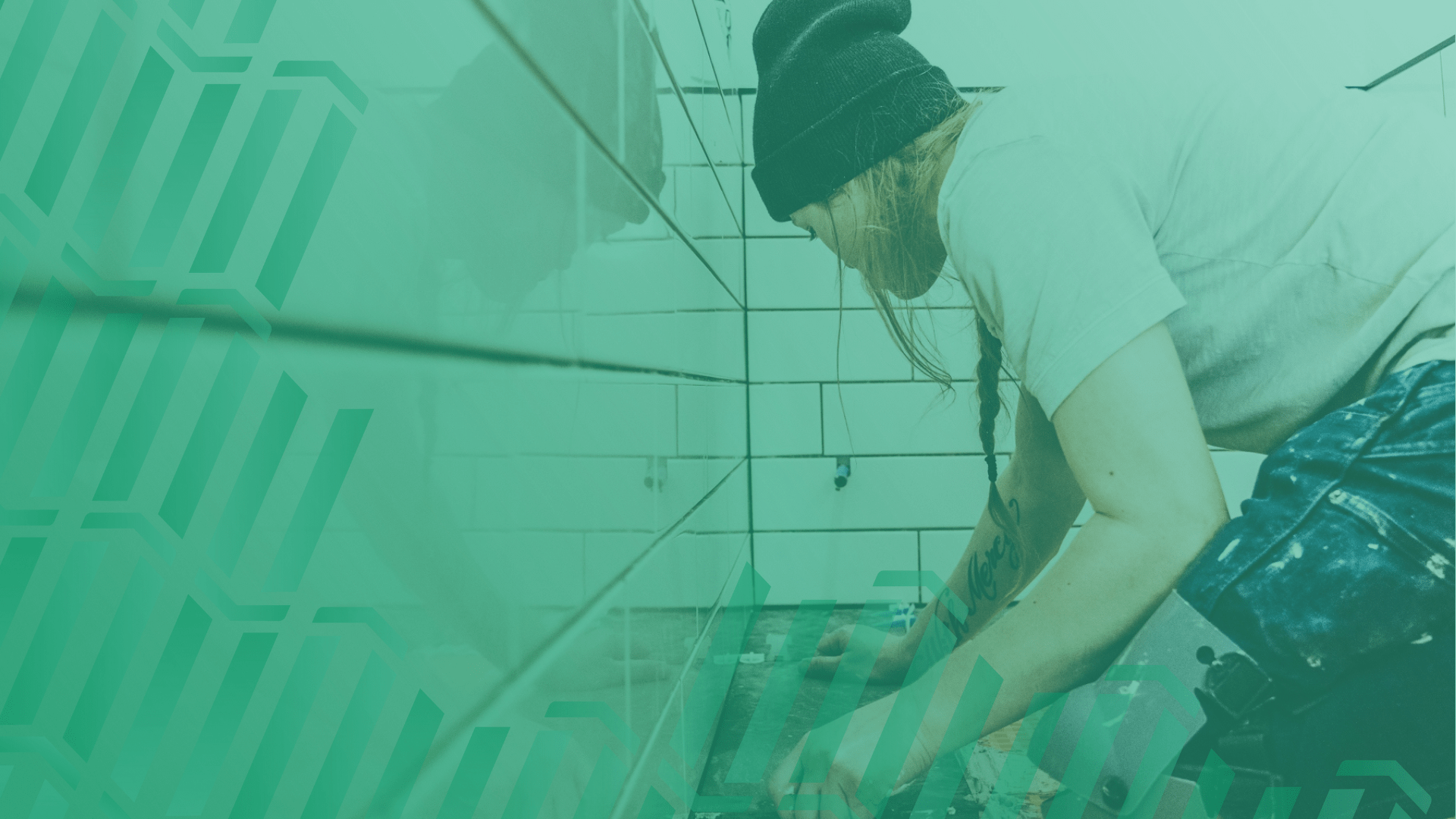
Women plumbers are reinventing the plumbing industry.
March is Women’s History Month, so we’re revisiting this important topic:
Previously, we ran two posts on women in the field services—interviews with Hattie Hasan of Stopcocks Women Plumbers and Angie Snow of Women in HVACR—and the topic has exploded to the forefront of the public’s consciousness with newspaper articles, TV segments, and groups that cater to women in the industry.
March is Women’s History Month, so we’re revisiting this important topic. We got on the phone with three women who are making a name for themselves in plumbing (including a revisit to Hattie Hasan who has also launched the Register of Tradeswomen)!
They share what it’s like to be a woman in plumbing, the benefits of working in the plumbing profession, and how women can get involved.

Clare King: “Believe in yourself, stick at it—and do research.”
Commusoft: Tell us how Pink Lady Plumbing has attracted more women into the profession.
King: A girl saw my van with Pink Lady Plumbing on it, and she approached me to see if she could come and be an apprentice. It didn’t work out because I was still fairly new myself, so in the end, she decided to leave.
Then another girl phoned me; she’d been working alongside her husband and decided she didn’t want to work alongside him anymore. She wanted to get her gas qualification. So she came out with me once I was gas registered. We worked really well together, but unfortunately, she ended up having to leave because her husband had a stroke she ended up being a carer for him.
Then I trained my sister, and my sister went off and set up on her own, but we work closely together. In fact, I’ve trained my daughter recently, and she’s working with my sister today, so it works out quite well.
So in Northampton, there are probably five female plumbers, and one’s my sister who I trained, one’s my daughter, and the other is someone who worked with me for six years. So yes, I’ve done quite well in trying to get more women into the profession.
Commusoft: It sounds like the women are self-starters.
King: It seems like there are so many one-man bands or a couple of guys that have grouped together to work, so they’re not really in a position where they want to take a woman on. So it’s really only British Gas and the large companies that tend to take women from apprenticeship through. Most of the women I know who are in the trade have ended up being self-employed and doing it themselves.
Commusoft: Are women plumbers becoming more recognised in the field?
King: Definitely. People know that there are more women coming into the plumbing, and to be honest, I’ve always been lucky and haven’t really had any man be nasty or off with me.
I’ve actually employed a lad now as well. I employed him three years ago because at that time I didn’t have anybody; I just needed an extra pair of hands and at the time there wasn’t another female. I do a lot of work for builders, so he does obviously mix with quite a few of the guys as well, and he does get the odd comment about where his tutu is, things like that.
Commusoft: Having been in the business for 13 years, have you seen that the number of female plumbers has been increasing?
King: On social media, I’ve seen there are quite a lot of female plumbers who are popping up on Twitter and Instagram. So definitely quite a few more women coming up. But I think it’s a shame that the schools don’t seem to push plumbing.

Commusoft: Are there any differences in the wages or the amount that you charge versus what a male company charges?
King: I would say that I probably do earn less. I charge the same as any of the male plumbers, but I think there’s a little bit of conscience, more so with women. For example, say you’ve got an elderly lady or someone who is possibly struggling a little bit. If I’m only there half an hour instead of the hour, I will tend to knock my charges down accordingly. Whereas I don’t think men do that as much, so I probably am earning slightly less than a male equivalent out there.
Commusoft: What would you tell an aspiring woman plumber who’s afraid to get started?
King: Just to believe in themselves, and try and do as much research as possible. I think it’s slightly easier now that there’s so much information on the internet. If you’re going out and looking at a toilet repair, you can type in the manufacturer and there are usually instructions so you can read up before you even get to a job.
And just stick at it, really. There are some dark days where nothing seems to go right and you do a repair and it doesn’t work out. You’ve got to be a little bit hard-skinned and just keep plodding through.
I always felt that I had to work twice as hard to be treated half as good, because I was always waiting for men to go, “Wow, she’s not done that very well.” But actually, towards the end of college, I made sure that I passed the exams with flying colours, so men were coming to me and saying, “How’d you do this?” and “How did you get that done?”
Judaline Cassidy: “Plumbing is a lucrative, life-changing opportunity.”
Commusoft: How did you get started as a plumber?
Cassidy: My life as a plumber was an accident. I grew up in Trinidad and Tobago and I wanted to attend law school. I grew up with my great-grandmother and she passed away, so I was unable to attend the university. The trades was the next best option. I realised that with electrical, you can get shocks and with plumbing, you get wet. So I was like, “Plumbing, here I come.” I really wanted to argue cases on behalf of people who couldn’t defend themselves, but the minute I started doing plumbing I fell in love with it, and I am still in love with plumbing.
I moved to the United States in 1989 and I didn’t really get back into plumbing because it was difficult. But my neighbour knew that I did plumbing, and he was part of a coalition of minority people in neighbourhoods where a lot of these construction buildings were being built—but they didn’t get the work, so they went and they demanded jobs. They told the builders they had a plumber, and when I showed up on the job everybody literally laughed in my face.
So I told the foreman that if he gave me an opportunity to work today, and I proved that I can do it, he’d keep me. If not, he didn’t have to pay me for my work. And I proved that I was good and they kept me.
Commusoft: Had you met any other women plumbers?
Cassidy: No, for years I was the only woman on the job. But that has changed a lot, and I love that. There’s an increase of women of all different trades on the job site now, even plumbers.
Commusoft: Do you think that anything has changed as far as women being more welcomed and accepted in the trade?
Cassidy: I believe the younger generations, Generation X and Millennials, have embraced seeing women in the job and being okay with it. Now mind you, there were some old-timers who were also OK with it, but I think the shift is happening because we kept letting our little boys and girls see a plumber being a woman, an electrician being a woman, a crane operator being a woman. So we planted the seeds.
Now, women need to be exposed to that—that this possibility exists and it’s a very lucrative possibility, life-changing even. It also comes with a lot of great benefits [in the U.S.] like life insurance and health insurance.
I have met women who were homeless, women whose husbands left them, and they found a trade—and they wished they had found it sooner because nobody talks about it. So I think more women need to be exposed to the amount of money and the freedom that comes with working in the trades.
The numbers would change if there were more visual representations of us on television. So in a scene or commercial where they would usually put a male plumber, why not put a female? The electrician…why can’t she be a woman?
It’s like the Shonda Rhimes effect of Grey’s Anatomy: More women became doctors, and more African American women became doctors. The same thing with lawyers and L.A. Law. Even Black Panther—now a lot more young black girls want to be coders. So imagine if somebody did that for the construction industry.
Commusoft: What’s the best news about the industry for women plumbers? What do you tell an aspiring woman plumber who’s afraid to get started?
Cassidy: I say jump in, but I don’t want you to be delusional that people are going to like you right away. You’re always going to have to prove yourself, no matter what. And you have to work twice as hard as your male counterparts.
All of those are the disadvantage, but the advantages are that you’re going to learn a skill that nobody can take away from you, and you can travel anywhere in the world and always have a job.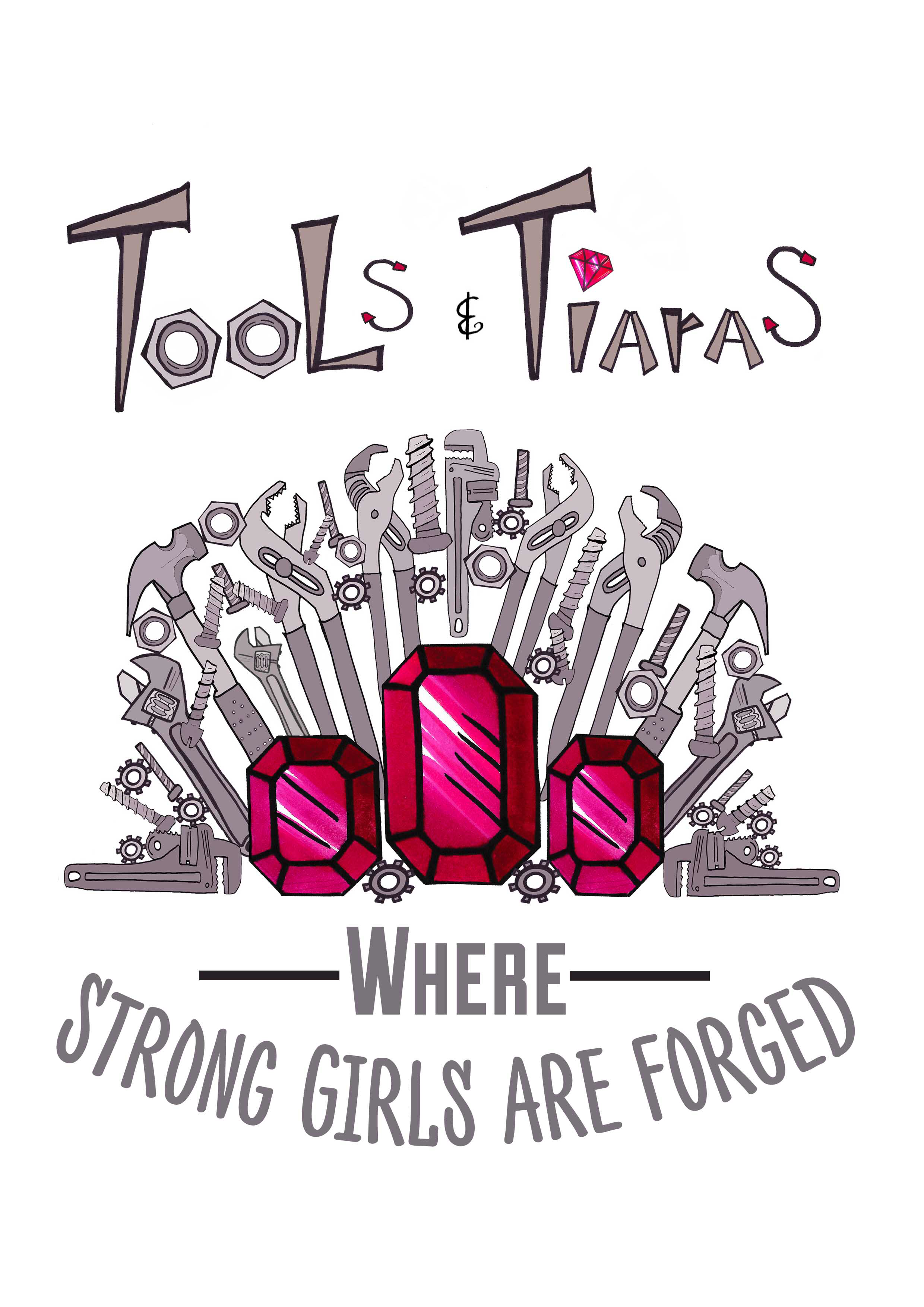
Commusoft: Let’s talk about Tools & Tiaras and how that got started.
Cassidy: Tools & Tiaras got started because I always wanted to let women and girls know that when you become a tradeswoman, you actually become a superhero since there are not a lot of us doing it. And really, you are a superhero, because we create and build civilisation. We build buildings that people inhabit.
When I was growing up, I had no self-confidence. I didn’t believe in myself. The shift happened when I became a plumber and I realised, “Whoa, I build stuff with my hands”. I wanted to empower girls from a young age that they can build anything, they can use a drill, they can use cement, they can wire electrical outlets.
The goal of Tools & Tiaras is to put good tools in girls’ hands and to empower them for life, because nothing is more empowering than working with tools. I always wanted girls to know that you don’t have to be one way to be in construction. I am very feminine and I’m very tomboyish at the same time.
At a career fair that we have in March for Women’s History Month, we’re having a fashion show. The tradeswomen are going to walk down in our work gear, and then in what we wear outside of work, because we want girls to see that you don’t have to be any particular way.
Hattie Hasan: “It’s a fantastic and fulfilling career.”
Commusoft: Tell us about how Stopcocks got started and how it’s growing.
Hasan: [When I got started] nobody would employ me. Although the college was very supportive, I couldn’t get a job for love nor money. So I just went straight into self-employment, and Stopcocks was born in January 1990. As soon as I learned something, I basically went out and sold it as a service.
Fast forward to 2006, I decided that I had to start thinking about an exit plan, a plan for when I’m not plumbing. I wanted to do that in a sort of ‘become a better plumber’ type of way. So I decided I was going to build an army of women plumbers and we were going to make a difference to the world.
I went to an entrepreneurs’ convention, and I stood up and I said what I was going to do. And once I made that announcement, I had to really try and find a way of doing it. I built myself a website and created a community of women as I could find them. We were very, very, very scarce then.
People started asking me if they could be my apprentice. I said no because, again, that would tie me down to one place and one person.
So I started thinking about how I could duplicate what I was doing, and the idea of a franchise popped into my mind. I started it and had a five-year period where we were just piloting it—basically, we were allowing women to come in and we helped quite a few women get qualified by giving them onsite experiences.
Then, a couple of years ago, we launched as a franchise, and we’re doing really well. That coincided with us running our first Women Installers Together conference, which we got the industry to sponsor. They said they thought it was a good idea, so we said, “Well, if you think it’s a good idea, then put your money where your mouth is.”
The conference is on the fourth of July in central London, and it’s free. If people are trainees and they want to be employed or to meet with potential employers, then they’re very welcome to come to the conference.
We’re actually becoming visible and we’ve really built a profile for ourselves. The trades press are really behind what we’re doing. After last year’s conference, five or six of the main ones contacted us and said, “There must be something we can do. It’s time for us to step up and see if we can jump on this wave that you’re creating.”
Commusoft: It sounds like as a community, women plumbers support other women rather than compete with them.
Hasan: Yes. There isn’t a brilliant community, because we’re so scattered. That was one of the purposes of the conference; some of the women who came had never seen another female plumber. It was a brilliant opportunity for them to network with each other, gain inspiration from each other, and just share stories.
Commusoft: Is it easier for women to jump into the plumbing industry or is there still some hesitation on their part? And on the men’s part?
Hasan: The answer to both of those bits of the question is yes, it is easier—but we still get trolled by male plumbers, telling us that we shouldn’t be plumbing. So yes, it is easier in that there are more of us; we’re a little bit more visible. There still aren’t enough of us by any means. We’re still less than one per cent. It’s very difficult to get the placements they need to fully gain their qualification.
One of the things that we’re doing to mitigate that is we’re setting up, at this moment, a Stopcocks Foundation. The Foundation is really so that companies don’t have the excuse that they can’t afford to pay women. Women will apply and gain finance so that they can pay for themselves to take their own apprenticeships.
Commusoft: How about women plumbers who are self-employed? Do they earn as well as men?
Hasan: Women are notoriously bad at charging, but they’re getting better. We created a kind of bespoke system for them to do invoice management—so it’s not like they have to actually ask for pounds, they just send an email with the invoice, and that helps them to charge properly.
We find if you have to say, ‘I want this many pounds’, it’s very difficult for it to come out because it sounds like a lot of money—but if it’s written on a piece of paper or on an email and an invoice, that really helps our women to charge properly.

Commusoft: What would you tell an aspiring woman plumber?
Hasan: I’d tell them definitely to go for it, because there are places that do take them. There are large companies where equal opportunity is imperative, so they have to give women a chance. And when we’ve got our Foundation started, they’ll be able to apply for funding from that.
I say to them, go for it and get a bit of experience, and then come be self-employed. Join us.
Commusoft: For women plumbers who’ve been in the business for a while and may be getting discouraged, how do you keep them excited about what they’re doing?
Hasan: The main thing about women plumbers is that they’re not children when they decide to become plumbers. The majority of women decided to go into plumbing as a second or third career. So they absolutely love it already.
There are a few who have had their work sabotaged, or horrible things have happened to them, and they decided that they don’t want to do it anymore. We told them to please continue, please try and carry on, because it’s a fantastic and fulfilling career.
It really is, and it pays well. To be able to fix things, and to be able to make water work, is a fantastic thing.
Check out the plumbing software that will help you achieve all this and more!
Now, in 2021, Hattie’s seen even greater success with Stopcocks continuing to go strong.
She’s also opened the Register of Tradeswomen; an organisation committed to helping, promoting, and creating an impact for female plumbers and tradeswomen from a variety of backgrounds.
In her mission to transform the trades industry in the UK, Hattie has been making fantastic use of Commusoft to drive the success of her endeavours.
Through our mission to educate and empower field service companies, we are driven to help your business learn, grow, and succeed in any way we can:


Linda Formichelli
Linda is a long-time journalist and content writer.
